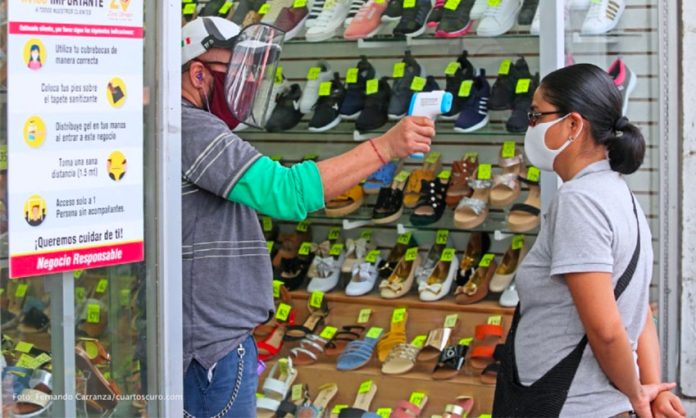Jalisco Governor Enrique Alfaro has warned that stricter economic restrictions could be imposed if new coronavirus case numbers continue to increase as has occurred in the state over the past two weeks.
In a video message posted to social media on Monday, Alfaro said that a lot of people, mainly adolescents and young adults, have stopped following the measures designed to stop the spread of the coronavirus.
“We’re going out to carry out nonessential activities without [taking] the necessary care. The commercial centers are full of people walking around, the tourist centers are at their limit, and bars and restaurants are full,” he said.
“The most worrying thing is that a lot of these people who are out and about have stopped using face masks, and a lot of businesses have stopped implementing the established [health] measures. … This reality is reflected in hard data: infections are increasing among the young population, who are taking the least care,” Alfaro said.
The governor said that 40% of new infections are occurring in people aged 15 to 34, adding that while they are “more resistant” and thus less likely to have a serious illness they can still infect their parents and grandparents, who are “at much greater risk of dying.”
According to Jalisco government data, 73,910 coronavirus cases have been detected in the state since the start of the pandemic and 3,398 people have lost their lives to Covid-19.
Alfaro said the number of active cases rose above 4,000 during the past week and that the number of new cases detected per week per 1 million inhabitants had increased to 360 from 285 two weeks prior.
He said that if the weekly incidence of new cases exceeds 400 per 1 million inhabitants, and hospital occupancy increases above 50% (it is currently 19%), he will be forced to activate the so-called “emergency button” and apply stricter restrictions to stop the spread of the coronavirus.
Alfaro has explained previously that almost all economic activities would be required to come to a complete halt if he presses the button.
“There are those who think that the button is just a threat to try to make people comply with their responsibilities. Believe me that it is not. We have shown that we know how to take decisions, as difficult as they might be, to look after Jalisco residents and that’s what we’ll continue to do,” he said in his new video message.
The governor said that 92% of economic activities have resumed in Jalisco but there is no possibility that the other 8% will be able to restart in the short term.
“We cannot yet allow the return of people to stadiums, the opening of nightclubs and any kind of mass events. Regrettably we cannot yet think about the return of in-person classes,” Alfaro said.
“We have to act with caution and take care with every step we take so that we don’t regret it later,” he said before urging mayors to ensure that coronavirus restrictions and mitigation measures are enforced in their communities.
“Without your support the strategy that we have built cannot work,” Alfaro said. “Rules are there to be complied with and I trust that municipal authorities will once again enforce this principle.”
Source: El Universal (sp)
